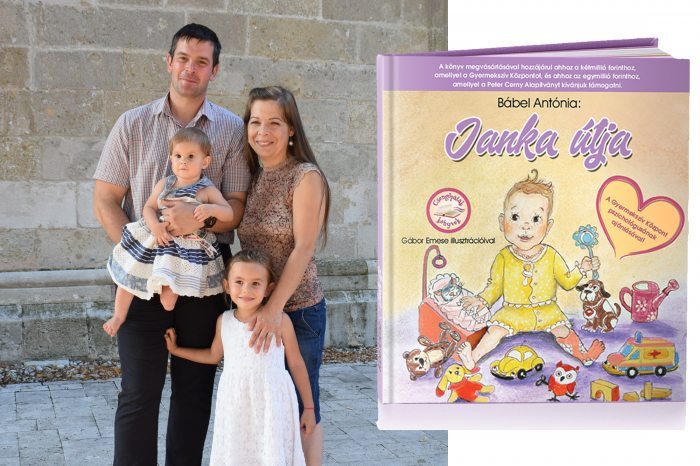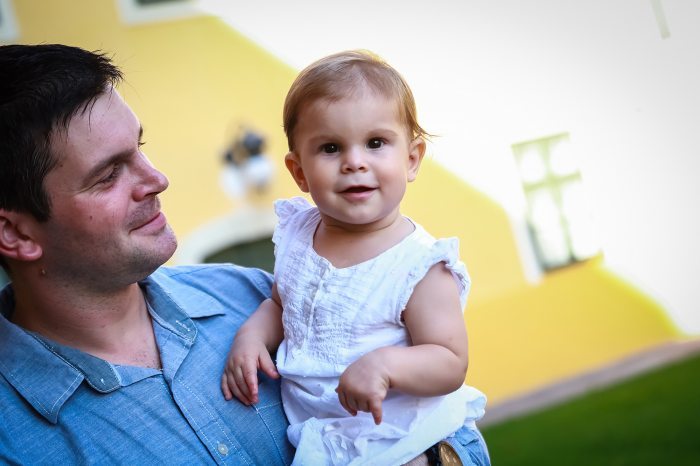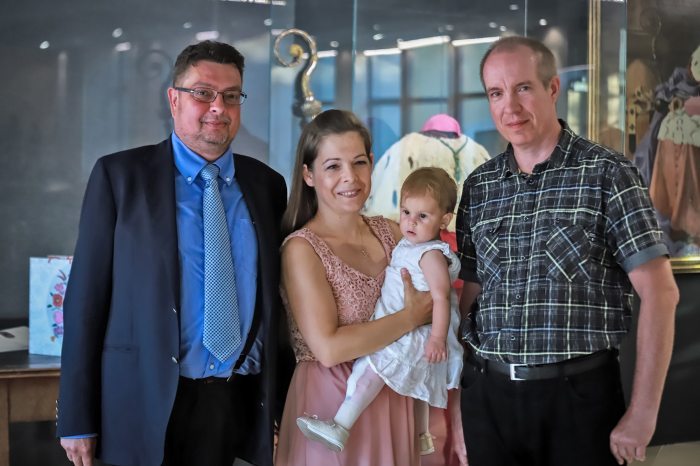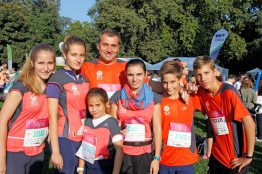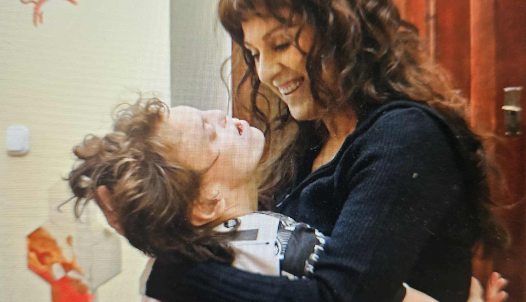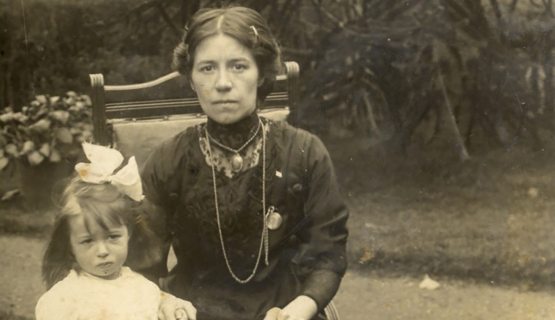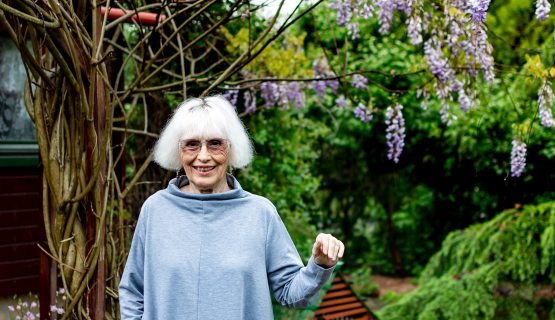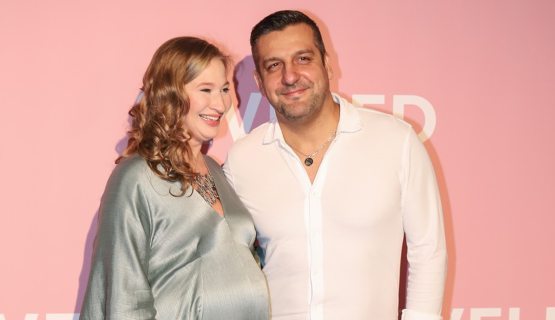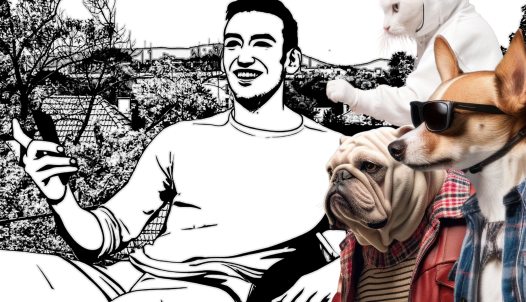'We made a miracle out of hell' - Antónia Bábel wrote about her child's fight for life in fairy tales
Janka is a special little girl: she underwent life-saving heart surgery when she was just a few days old. She hadn't even opened her eyes to this world, she didn't know what kind of place she was coming to, yet she fought for her life. The life of the second child of Antónia Bábel, a fairy tale writer, began with trials that you cannot find in any fairy tale. Or you can now since her mother has turned the story of the little hero into a special storybook. It became a bestseller.
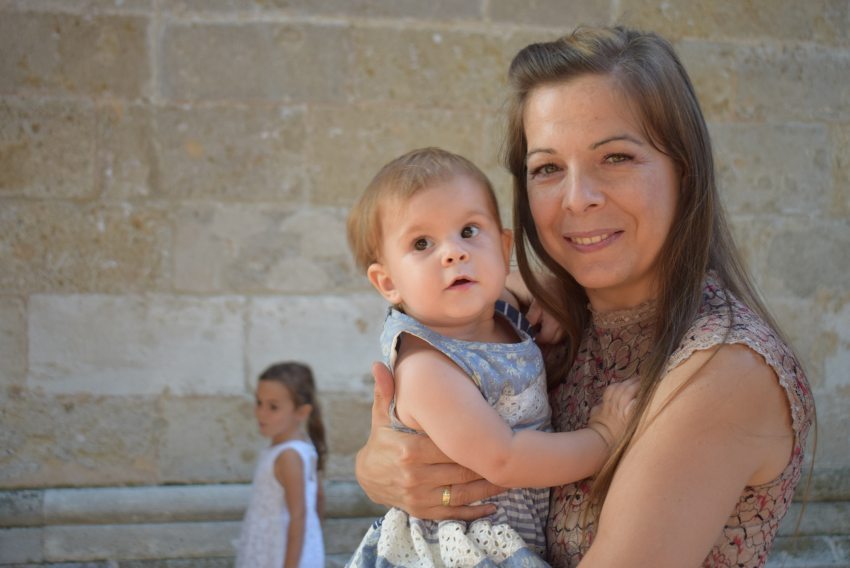
Janka was born from an unproblematic pregnancy and her mother spent her first days in the hospital with her baby in the greatest happiness. But when she went to the nursery to pick up Janka after one of her evening baths, she saw doctors surrounding her.
Just a routine procedure
”I thought it was just a routine check-up, but they sat me down and told me that Janka's skin was discolored, greyish-blue, which they suspect is a very rare metabolic disorder. My little girl's vitals continued to deteriorate, but the next day the doctors still didn't know what was causing the problem, so they referred us to the Bókay Street Children's Clinic. At home, they had already prepared a festive reception for us, so my first reaction was that we had to go home because they were waiting. At that time I didn't know that in the most frightening moments of life, you cling to the things of this world in unrealistic ways."
At the children's hospital, Janka was immediately examined by a doctor specialising in rare metabolic disorders, and after fifteen minutes she pronounced: the little girl was now in a life-threatening condition, her life was hanging by a thread and she needed to be admitted to intensive care immediately.
"My husband and I were devastated, we were overwhelmed by the insecurity and vulnerability."
"Meanwhile, I found out that there were no beds available for parents in the hospital, but all I could think of was that even if I had to sleep on the floor, I wouldn't move from her cot. The diagnosis was that the vessel leading out of Janka's heart, the aorta, was almost completely blocked, causing this huge circulatory problem. Basically, her lower limbs were not getting enough oxygen. Shortly afterwards, an ambulance came but I couldn't fit in and had to let go of my baby's hand. I just kept saying to her, as a goodbye, "Hang on, I'm here, I'll go after you with daddy."
Antónia will never forget the poignant feeling as the ambulance with sirens wailing sped off with her newborn baby. Up to the time the parents reached the infant intensive care unit of the Gottsegen György National Cardiovascular Institute, they felt that such horror was only happening to them. But there they met dozens of other parents in similarly difficult situations.
The life-saving surgery
"I saw her in her little bed and I saw the other babies next to her, who were also fighting for their lives. It's amazing, the superhuman work that nurses and doctors do. They fight for the children to the very end. I remember entering the third-floor ICU and seeing each parent hanging their gown on a numbered hanger. Then one of the nurses told me to make a mental note, my hanger would be number five. For me, that sentence was the clue: I have my own gown, I will have someone to visit."
When Antónia, in gown number five, first saw her daughter in intensive care, the little one was already covered in tubes and wires, with an artificial vein in her neck.
An infusion tower was pumping life into her, initiating mechanical ventilation this tiny child, whose condition had deteriorated so much that the parents were repeatedly told that it was not certain that Janka would survive the difficult surgery. Yet the three-hour operation performed through the back was the little girl's only chance of survival.
"The reason why this heart problem was not recognised during pregnancy was because the blockage was in a place that was not yet under blood in the womb. There's a blood vessel called the Botallo wire, which shuts the lungs out of the circulation while the fetus feeds and takes in oxygen through the umbilical cord. Even though the blocked aorta had been there for months in Janka's heart, because there was no blood flow, it was not a problem. But when the Botallo conduit closed at birth, there was nowhere for the blood to flow through, it just flowed slowly. In the meantime, the pressure difference caused the wall between the heart chambers to leak, a hole they did not dare to operate on at the time because she would not have survived. This six-hour operation took place in December."
Extract from the story "Secret Hides" (from the book "Janka's Tales" by Antónia Bábel).
It took a long time for new doctors to clear the blockage and finally unblock the blood flow. The soldiers of the heart followed the whole "operation" on the monitor.
When the nurses took over from the doctors, the captain said:
- "Colonel, now that the danger is over, may I ask what's in the secret hiding place?
- You don't know, do you? – the colonel asked a little impudently - "They didn't teach you that in training, because only old foxes like me know! I'll tell you one thing, Captain! That's where emotions live, that's where love lives. It's complicated, don't ask me. In time, you'll understand. Just remember that the secret hiding place and the heart must be protected at all costs. Do you understand?
Antonia and her husband, László, waited in the empty hospital corridor during the operation through the whole night, shivering every time a door opened fearing from bad news. Before the operation, they asked their friends on their social networking site to pray for Janka, who is in big trouble.
"I felt like we were fighting a hostile force and we would not succeed without prayers. The appeal led to thousands of people praying for Janka, writing masses for her, forming prayer groups, and there are some who have been praying for us every night ever since."
Extract from the story "Flowers of the Heart" (from the book "Janka's Tales" by Antónia Bábel)
While the earth was doing its best for the flower, the stars began to dance. One after another, from the smallest to the largest, from the nearest to the farthest. They shone so brightly that they could be seen in the sky even in daylight. All at once, a single, brilliant beam of light emanated from them towards the little flower, embracing it and enveloping it like a dawn dew from its base, through its leaves, to the base of its flower head.
When the surgeon who performed the surgery emerged from the operating theatre, smiling, it was as if the rope had been removed from the parents' throats. The operation had been a success, Janka would survive, and the recovery period could begin - they thought, but unfortunately, as is usually the case in fairy tales, there were more than one trials for little Janka.
The struggles of the little veins
"The doctors said that if everything goes well, we will be home in a week or two. I insisted on giving her breastmilk, so I was consciously paying attention my milk not to run dry. I took great pleasure in giving Janka several bottles of fresh breast milk every day through the syringe. But unfortunately our happiness lasted only for two days because she had a thrombosis and one of her feet went purple. I thought that if a life-saving operation had been successfully performed, nothing could be wrong, but by the next day Janka's left leg was purple to below the knee. However, because of the circulation problem, she could not receive the necessary amount of blood thinning medication because of the risk of a stroke or other internal bleeding."
Although the hospital's vascular surgeon initially refused to perform the operation, because of the small cross-section of the blood vessels, he eventually did. As a result, the clots were removed from Janka's thigh. Unfortunately, her leg could no longer heal, so although the doctors were hopeful for a while, they had to give the parents the bad news: part of her left leg would have to be amputated as it was starting to die.
"I remember, the amputartion was performed on a Saturday, my husband and I went to a nearby shopping centre during the operation and we just ate and ate. As bizarre as it sounds - it was - we even joked about whether there was anyone else there in a similar situation to us.
It was a totally unrealistic situation, we were balancing somewhere on the edge of insanity, our psyche needed something from our old, normal lives to survive what had just happened to Janka with our sanity intact.
When I went to see her after the operation, I immediately checked to see if her knee was still intact. As our leg grows from the knee, this was strategic for Janka's future life. If it had been amputated, she would have had a ten centimetre long leg for the rest of her life."
Excerpt from the story "From New Year's Eve to Christmas" in the book "Janka's Tale" by Antónia Bábel:
She repacked the dolls, who bumped and bumped for another four days before finally reaching their original destination. The storyteller unpacked them with curiosity, but when she picked up Betti, she was shocked.
- She is missing her left arm! How could I give it as a present?
He placed the three dolls side by side, looked at them, admired their clothes, the pouches tied around their wrists, their curly hair, but she could not hide her disappointment.
- What can I do with you? Who could be happy with a doll with one arm?
The storyteller was expecting a child. She could hardly move with her big belly. She packed away the dolls again, and there came a long wait in the box...
The book of gratitude
After the amputation, it was finally truly a period of recovery. It was sixteen days before Antonia was able to hold her baby for the first time, until then there were times when she could only stroke her with gloves on.
"Janka was baptised in the intensive care unit by the Greek Catholic hospital chaplain, Father Mihály Mihálovics. We were standing there in the green robes in the afternoon, I was crying the whole time, and the nurses were watching this unusual film-like scene from behind the counter. We felt it was important for Janka to receive the sacrament of baptism as soon as possible."
It's hard to imagine what this family has been through, but the parents' hearts were filled with boundless gratitude besides the sense of pain and loss.
They were grateful to the doctors, nurses and ambulance men of the Peter Cerny Foundation, and decided from the very beginning of their stay in hospital that they would commemorate the work of these hard-working hands in a storybook.
"I wanted to give something that was a part of my being, that I could give to them in the same way that doctors have given us their best and their souls. I wanted a gift that they would associate with Janka and her parents even after five years. I was eager to write a storybook that includes all the difficulties and joys we have experienced, highlighting the good things that have become part of our lives as a consequence of these events: we made friends during our weeks in hospital and we have kept in touch with them ever since. Feedbacks make me happy: I receive messages from readers all over the world, many of whom have been through the same sad events. Our story gives them strength, or shakes those up who have not gone through such horrors. I have also received, and continue to receive, a lot of love from guests at book launches. It is an endless honour to have the doctors and nurses of the hospital present on these occasions. The storybook has been a great success, thanks to the fact that it was also available for purchase at one of the petrol station chains. At the end of 2020, I was able to transfer HUF 1 million from the profits to the Peter Cerny Foundation and HUF 1.6 million to the Foundation for the Protection of Children with Heart Diseases (“Szívbeteg Gyermekek Védelmében Alapítvány”), for which I am very grateful to those who bought the storybook."
Janka heals the psychological wounds of parents
She was one year old when she got her first artificial leg. Her parents searched persistently from New Zealand through Africa to Israel because feet that small are not made anywhere.
Finally, in Budapest, two technicians carved a foot for the little girl with their own hands. Janka is a fantastic child, a cheerful, outgoing person who fortunately remembers nothing of the horrors of the first few weeks of her life. At nearly two years old, she walks across the room. But her parents and Lenke, Janka's four-year-old sister, have had to process what had happened. "At first, my husband and I were both wrapped up in our own trauma and talked very little. When we came home from the hospital, I couldn't find my place at home for three months, I didn't feel safe. In the hospital, help was always at hand, but at home I suddenly felt very alone, and the responsibility of constant medication was also a big one. Sometimes we were so exhausted that we couldn't even remember whether we had given her the current dose or if we had mixed everything in. There were also times when the respiratory monitor would beep at night, and it was only after the fourth time that I managed to wake up Janka."
The biggest challenge in writing the storybook was the depiction of amputation. Antónia was still struggling with the experience of loss herself, it was difficult to make the event palatable and accessible to children, but the book could only be complete with this.
They often read the storybook at home, too, and it helps Janka's sister Lenke to process the story.
"Janka is at the age now where she's looking at my feet, tapping her tiny foot and pointing out to her father that something is different here. Luckily, she often asks to put the prosthetic leg on and is happy to be able to walk."
"Looking at her and the infinite strength that she has, now, almost two years later, I can't say that what happened to us was a complete disaster or that I would erase it from my life. I am a much better person because of it."
In the hospital, you learn self-control and patience, you experience how fragile life is and how vulnerable you are. As we were waiting during the first surgery, my petty things were wiped away, it was like a cleansing fire. I reassessed life, it became clear to me what was really important. I realized that true happiness comes from pain... I think we made a miracle out of hell. I understand when people say or write to us that we are heroes. Everybody is a hero when they turn up in the intensive care unit of the Children's Heart Centre."
